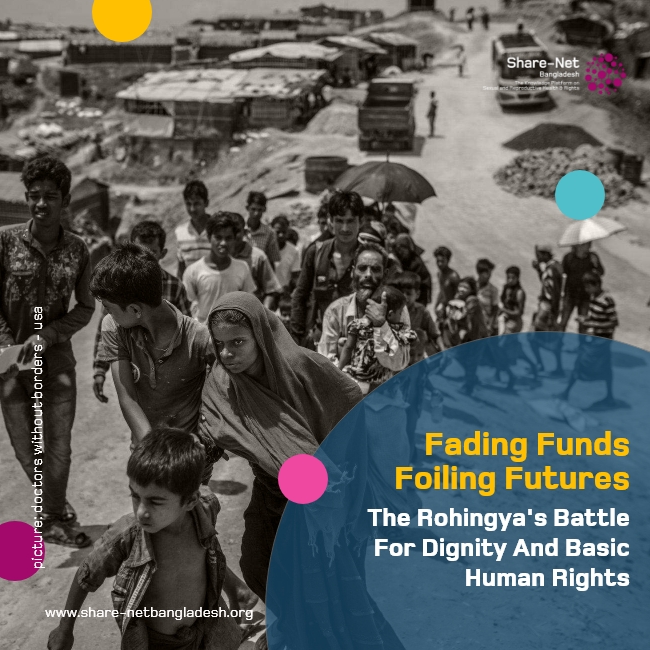Fading Funds, Foiling Futures: The Rohingya’s Battle for Dignity and Basic Human Rights
Bangladesh received only 50% of the required funding for the Rohingya refugees in 2023, leading to deteriorating conditions in their camps. This shortage has severe implications, especially for sexual and reproductive health and rights (SRHR). With over 30,000 newborns joining the camps each year, addressing SRHR is becoming increasingly critical.
More than half of the Rohingya population in the camps are children under 18, facing limited opportunities for education, skills-building, and livelihoods. The demographic profile shows 55% are children, 41% adults, and 4% older people, highlighting the urgent need for comprehensive SRHR services. Underfunding compromises essential services like contraception, family planning, and maternal health, directly impacting the Sustainable Development Goals (SDGs), particularly those focused on health, gender equality, and reduced inequalities.
Bangladesh’s government, the largest donor in 2024, spent around $1.69 billion in 2022 on the Rohingya crisis. However, the funding appeal for 2024 seeks $852.4 million to support 1.35 million people, including Rohingya refugees and host communities. With the gap between humanitarian needs and funding widening globally, the allocation has now dropped to $8 per person per month from the previous $12.
My co-authored papers in the Journal of Global Health and Lancet Global Health highlight the enormous challenges in improving living conditions to ensure SRHR. In the camps, child marriages and adolescent pregnancies are prevalent, and the use of contraception is low. This high birth rate requires more critical attention to family planning and maternal health to align with SDG targets on good health and well-being.
Bangladesh’s reliance on foreign loans to support the Rohingya FDMN could significantly increase its future debt burden. Effective interventions in family planning and maternal health, alongside sustained humanitarian assistance, are essential to meet the basic needs of Rohingya women, children, and men, who face higher risks of abuse, exploitation, and gender-based violence.
Local host communities have also been adversely affected, experiencing low income, youth unemployment, and limited land cultivation. The increasing frustration and deteriorating relationships with FDMN have led to rising crime rates, including human trafficking and illegal drug activities.
The voluntary repatriation of FDMN is crucial for a long-term solution. However, with 1.2 million FDMN in Bangladesh, it will take nearly 6.5 years to return them at a rate of 500 per day. In the meantime, the international community must continue to provide adequate funding. Enhancing humanitarian aid, focusing on SRHR, and addressing protection and security challenges in the camps are vital steps toward sustainable development and achieving the SDGs.
Maximising humanitarian assistance and concerted efforts on the repatriation process should be key focuses for all stakeholders to alleviate the immediate funding gap and ensure a sustainable and effective solution to the crisis.
Source: The Business Standard
Picture Credit:

